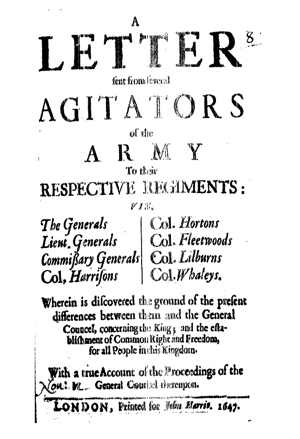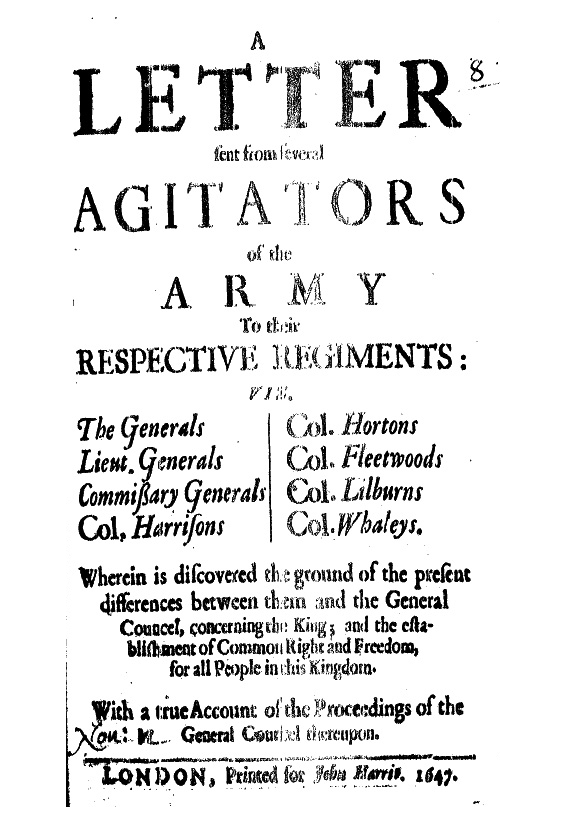
Edward Sexby, A Letter from Several Agitators of the Army to their Respective Regiments (11 November, 1647)
 |
 |
| Edward Sexby (ft. 1642–1667) |
For further information see the following:
- This is part of the Leveller Collection of Tracts and Pamphlets Project.
- some biographical information about Edward Sexby.
- a full list of the Leveller Tracts and Pamphlets in chronological order

Bibliographical Information
ID Number
T.119 [1647.11.11] Edward Sexby, A Letter from Several Agitators of the Army to their Respective Regiments (11 November, 1647).
Full title
Edward Sexby, A Letter from Several Agitators of the Army to their Respective
Regiments: viz. the Generals, Lieut. Generals, Commissary Generals, Col.
Harrisons, Col. Hortons, Col. Fleetwoods, Col. Lilburns, Col. Whaleys. Wherein
is discovered the ground of the present differences between them and the
General Councel, concerning the King; and the establishment of Common Right
and Freedom, for all People in this Kingdom. With a true Account of the Proceedings
of the General Councel thereupon.
London, Printed for John Harris, 1647.
Estimated date of publication
11 November, 1647.
Thomason Tracts Catalog information
TT1, p. 569; Thomason E. 414 (8.)
Editor’s Introduction
(Placeholder: Text will be added later.)
A Letter sent from the Agitators of several Regiments of the Army to their respective Regiments &c.
Gentlemen and Fellow Soldiers,
VVE esteem it our duty to render you an Account of the present state of our affairs with us, and at the head quarter. We have been consulting about the most speedy and effectual settlement of your and all the peoples Freedoms, whereby the people may be disposed into a capacity and willingness to provide constant pay, and secure our Arrears: we found by sad experience, that there was so possibility of obtaining either, so long as the settlement of the peoples freedoms was delayd, and therefore as well in love and reall respects, to you, and to our dear Country; we were constrained to propound he foundations of freedome to be forthwith establishedby a mutual agreement between the people and you: and though we dare aver that there is nothing contained in that Agreement, or in the Case of the Army stated, which is propounded to be insisted on, but what is (at least) the equitable sense of our former Declarations and Remonstrances; yet we find many at the Head quarters, obstructing and opposing our proceedings.
We sent some to them to debate in Love, the matters and manner of the Agreement: And the first Article thereof, being long debated, it was concluded by Vote in the affirmative: viz. That all Soldiers and others, if they be not Servants or Beggars, ought to have voyces in electing those which shal represent them in Parliament, although they have not forty shillings per annum in freehold Land; and there were but three voyces against this your Native Freedom: after this they would refer all to a Committee: And the next General Councel our friends obtained a general Rendezvouz, and a Letter from the Councel to clear the Army from any desire or intent of constraining the Parliament to send new Propositions to the King, whereby your Indemnity for fighting against the King should be begged of the King, and so the guilt of innocent blood taken upon your own heads; and your Enemies should boast and insult over you, saying, you were forced to ask them to save you harmless: At the next meeting a Declaration was offered to the Councel, wherein the Kings Corrupt Interest was so intermixt, that in short time, if he should so come in, he would be in a capacity to destroy you and the people; and assure your selves, if any power be but in the least given to him, he will improve it to the utmost to enslave or ruin you, that conquered him, and to advance your enemies to trample upon you: Upon this we desired only a free debate of his question, whether it were safe either for the Army or People to suffer any power to be given to the King: And Lieu. Gen Cromwel and the rest professed as before God they would freely debate it; And Monday last a General Councel was appointed for that purpose, but when they met they wholy refused, and instead of that, spake very reproachfully of us and our actings, and declaimed against that which was passed the Councel before concerning the voyces of those in elections which have not forty shillings a year free-hold; And against the Letter sent by the Councel to the Parliament: and the day before Commissary General Ireton withdrew and protested he would act no more with them unless they recall’d that Letter.
And to prevent any further debate they would have dissolved the Councel for above a fortnight, and thus our hopes of agreeing together to settle your and the Peoples Freedoms were then frustrate: and though the chief of them had desired some of our friends not above three days before to go on in their actings; for they might come in when they should do us more service then at that time; yet there they made great out-cries against us and complaints of distempers in the Army, which were nothing but endeavors after their Rights and Freedoms.
The next day they stil waved and refused the free debate of the aforesaid question, and disolved the Councel for above a fortnight, and for a time resolved; they would only prepare some fair propositions to the Army, about Arrears and pay, and sent to the Parliament for a moneths pay against a Rendezvouze; but they declared they would divide the Army into 3, parts, to Rendezvouze severally and all this appears to be only to draw off the Army from joyning together, to settle those clear foundations of freedom propounded to you, and to procure your Rights, as you are Souldiers effectually.
Thus you may observe the strange unconstancy of those that would obstruct our way, and the great matter wherein the difference lies, and the candidnes of our Actings: but we hope it wil be no discouragement to you, though your Officers, yea the greatest Officers should oppose you it’s wel known, that the great Officers which now opposed, did as much oppose secretly, when we refused to disband, according to the Parliaments Order; and at last they confessed the providence of God was the more wonderful, because those Resolutions, to stand, for freedom and justice; began amongst the Souldiers only; and yet now they would affright you from such actings, by telling you it’s disobedience to the Generals Command, and distempers, and mutinies. These were the words of that faction in Parliament which opposed you before and you may consider that you had done as much service for the people, by disobedience to the Parliament, as ever you did by obedience. If you had fulfilled your Declarations and Engagements which you then passed.
As for the moneths pay, if it come, you may consider, it’s but your due; and yet we beleeve none had been procured for you, unless we had thus appeared, and if any Declarations or Propositions about pay or Arrears be offered to you, remember you have been fed with Paper too long; we desire, that there may be a general Rendezvouze, and no parting each from other, til we be fully assured, we shal not return to burthen the Country by free quarter, and til our Arrears be actually secured, and the Foundations of our Freedom, peace and security in the Agreement established: And likewise, until a sure way be setled, for calling Commitees, Sequestrators, and Parliament men, to account for the Countries money; that so the Country may know, we intend their Good and Freedom, we know some fair Overtures wil be made to you about pay, Arrears, seeming Freedom and security; but we hope as you formerly rejected such Overtures from the parliament, knowing that without a settlement of Freedom, no constant pay or Arrears wil be provided: so now we are confident you wil not be deceived; and hope you are all resolved for a General Rendezvouze, that we may all agree together in fulfilling our Declarations and Engagements to the people, that so we may not become the objects of scorn and hatred. We shal now add.
Novem. 11. 1647.
We are yours, &c.
| Edward Sexby | The Generals Regiment. |
| Robert Everet } | |
| John Walter } | Of Lieut. Generals Regiment. |
| Edmont Bear } | |
| Joseph Aleyn | Col. Harrison |
| George Hastall } | Commissary General Iretons. |
| William Perkins } | |
| [Editor: illegible words] | Col. Hortons. |
| William Russel } | Colonel Whaley |
| Richard Seal } | |
| Richard Hilyer } | Col. Lilburns Regiment. |
| Tho. George } | |
| Iohn [Editor: illegible word] } | Col. Fleetwoods Regiment. |
| Will. Pryer } | |
| Will. Mitchel | Live-Guard. |